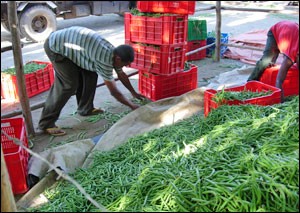- What We Do
- Agriculture and Food Security
- Democracy, Human Rights and Governance
- Economic Growth and Trade
- Education
- Ending Extreme Poverty
- Environment and Global Climate Change
- Gender Equality and Women's Empowerment
- Global Health
- Water and Sanitation
- Working in Crises and Conflict
- U.S. Global Development Lab
U.S. Government Resources
The International Trade Centre based out of Geneva helps developing countries achieve sustainable development through exports; activating, supporting and delivering projects with an emphasis on competitiveness. It provides counterparts, implementers, and USAID staff with access to internet tools to conduct analysis of trade and investment flows. These tools include Trade Map, Investment Map, and Market Access Map.

USAID’s African Global Competitiveness Hubs are designed to reinforce regional and bilateral efforts to strengthen Africa's economic competitiveness and assist the nations of the area to take greater advantage of the trade opportunities provided by the African Growth and Opportunity Act (AGOA) and other global trade initiatives. Hub program themes include trade capacity building, improvements to the private sector enabling environment, better market access and opportunities, trade facilitation, lower business costs, food safety programs, and export promotion of higher quality, profitable African agricultural produce.
The U.S. TCB Database compiles the results of an annual survey of U.S. Government agencies providing trade-related technical assistance to developing countries. The database provides details on the trade capacity building (TCB) work of U.S. Government agencies, including Country Activity Reports for country specific TCB information by implementing or funding agency, TCB category, and country or region.
The Office of the U.S. Trade Representative is responsible for negotiating trade agreements and developing trade policies which promote world economic growth and create new opportunities for Americans. Their website includes the complete text of all U.S. trade agreements.
The U.S. International Trade Commission is an independent, nonpartisan, quasi-judicial federal agency that provides trade expertise to both the legislative and executive branches of government, determines the impact of imports on U.S. industries, and directs actions against certain unfair trade practices. USITC publishes competitiveness reports and technical journals. Find data on U.S. imports and exports on the USITC’s Dataweb.
Non U.S. Government resources
The World Trade Organization (WTO) performs a comprehensive review of national trade policies through the Trade Policy Review Mechanism (TPRM). All WTO members are reviewed, the frequency of each country’s review varying according to its share of world trade.
Doing Business is an index of forty-four indicators, including trading across borders, measuring the relative ease or difficulty of doing business in a country. For more information on USAID’s work with Doing Business, see our Improving Business Regulation page.
The Enhanced Integrated Framework (EIF) for Trade-Related Technical Assistance to least-developed countries (LDCs) is a process that was first established in 1997 to support LDC governments in trade capacity building and integrating trade issues into a country’s overall national development strategies. The IF process includes comprehensive diagnostics of LDC’s trade regimes.







Comment
Make a general inquiry or suggest an improvement.